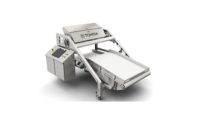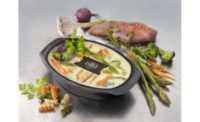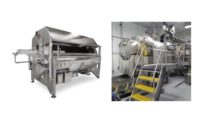IFFA showcases innovative solutions for smoking, maturing, cooking, cooling, heating technology

The IFFA runs from 7 to 12 May 2016 in Frankfurt am Main and gives trade visitors the opportunity to learn about innovative, economic and ultra-efficient meat industry solutions for smoking, maturing, cooking, cooling and heating technology. The current trend is towards multi-functional systems with intelligent, programmable controls, programme selection memory functions and continuous capture of process data.
Modern smoking and maturing systems need to supply large quantities of consistently high-quality products on a cost and energy-efficient basis. Other requirements include least possible weight loss, short process times, low maintenance costs and minimal labour use. There is also a requirement for automatic cleaning, the ability to choose between different heating types, climate packages for optimum aging/maturing and much more. These requirements can only be met if the systems are almost entirely automated – from the loading and smoking processes to the automatic cleaning of the systems, components, machines and flue gas.
Transparent processes provide safety
Flavour and product quality are determined to a large extent by the precise regulation and control of factors such as chamber, product and core temperatures, humidity, smoke density and smoke and/or air flow. The use of high-performance sensors and process controllers, intelligent programmes for the self-diagnostics of machines and systems along with the option of process optimisation based on remote maintenance ensure maximum possible system availability, efficient plant operation and compliance with tight deadlines. Touchscreens with intuitive, multi-lingual user interfaces, that are, above all, easy to use, provide operators with continuous status information with respect to current processes and system conditions. An increasingly important aspect is to be able to provide continuous process documentation for the purposes of quality control and end-to-end traceability.
Reduction of manual labour
Increasing requirements with respect to hygiene, product quality, economic efficiency and yield in addition to employee health and safety are the main factors driving the replacement of manual labour by automated processes. One example of this is the way sausage loops are hung on smoking rods and positioned exactly in the smoke trolley. Possibilities include everything from bespoke machines to six-axis articulated robots. These robots operate at exceptionally high speeds and with great precision and are also extremely careful in the way they handle the products. Compared to a manual feed they help operators achieve higher yields of good product whilst at the same time providing higher loading densities.
Meat aging/maturing
The meat aging process fundamentally requires a stable environment. Sensors continuously monitor the temperature and humidity of the cold room and/or aging cabinet along with the operating conditions of the vaporiser and condenser. They feed the measurements taken back to the process computer system, which automatically readjusts the respective units as and when required. This aging cabinet control system enables the desired temperature for the convection cooling, the fresh air intake, the humidity level and the time for a hygienic aging process to be set individually. UV sterilisation systems are increasingly used to treat the circulating air and the fresh air intake.
Cooking systems – economical and efficient
Extremely efficient heat transfer is essential for the economical use of energy when cooking, boiling and pasteurising. It is achieved by means of creating intensive, forced turbulent flows of hot air and/or steam in cooking units that are optimally insulated against outside influences. The computer controlled systems ensure that the temperature differences within the cooking chambers are not greater than 1° Celsius and so ensure a uniform temperature across the whole batch and therefore also the same cooking or boiling conditions throughout.
Save time and money with intensive cooling systems
It is possible to extend the shelf-life of meat and sausage products produced in smoking or cooking chambers significantly by rapid core temperature cooling. The essential aspect here is to pass quickly through the temperature ranges favourable to germ formation. To this end the micro-processor-controlled intensive cooling systems have all the necessary control devices for air circulation, cooling, compressed air humidification, core temperature measurement in addition to automatic fresh and exhaust air dampers. Intensive cooling also has other side benefits. For example, quicker cooling enables the products to be packed much earlier and so significantly reduces stock handling times.
Hygiene – a mandatory criterion
Through the integration of computer-controlled CIP (cleaning in place) cleaning systems in smoking chambers it is possible to ensure the necessary system hygiene quickly, efficiently and on an economical and environmentally friendly basis. Drainage systems sunk into the floor of the chambers enable reliable removal of all the washing water inclusive of cleaning agent to the waste-water treatment plant. Special smoke trolley washing systems with automatic programme controls represent another building block in process hygiene. When fitted with innovative nozzle systems these compact units remove even stubborn dirt.
Efficient exhaust air treatment
Manufacturers also offer fully automatic systems to treat the exhaust air from smoking chambers. The range includes everything from thermal and catalytic post combustion systems to high-performance electrostatic precipitators. The latter are especially efficient and extremely effective at removing particles of smoke and droplets of tar and water. Other options include absorption-based flue gas scrubbers to remove smells, gasses and fumes, UV light systems for the oxidisation of volatile hydrocarbons (VOC; Volatile Organic Compounds) and in special cases also bio filters and activated carbon filters.
The leading smoking plant manufacturers will be exhibiting at the IFFA in halls 8.0, 9.0 and 9.1. The companies exhibiting include, for example, BASTRA Bayha & Strackbein, Fessmann, KERRES, Red Arrow, Reich Thermoprozesstechnik, Schröter Technologie, Sorgo Anlagenbau and VEMAG Anlagenbau. Klaus Schröter, managing director of Schröter Technologie and Chairman of the VDMA’s Meat Processing Machinery Technology Group has high expectations of the IFFA: “For many years the global meat industry has shown dynamic growth. The markets are characterised by high demands for safety and hygiene, production efficiency, a wide range of different products and types of packaging in addition to many other individual factors. As the world-wide market develops, it needs a strong, internationally recognised platform like the IFFA to provide a comprehensive overview, pick up on trends and demonstrate solutions. These are the challenges that all the companies at the IFFA have set themselves and every one of them has something very special to offer.”
Full information about the IFFA is available at: iffa.com
Looking for a reprint of this article?
From high-res PDFs to custom plaques, order your copy today!





